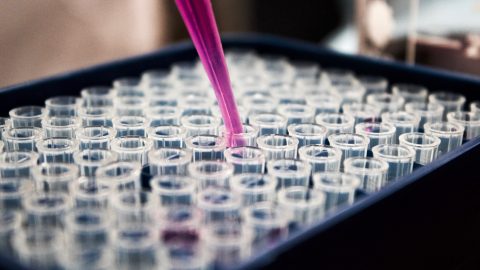In a press release on November 9, Pfizer gave a first taste of the results of the Phase 3 study of the Covid vaccine, which was jointly developed with German biotech company BioNTech. With an estimated efficacy of 90% and the start of the vaccination campaign possibly as early as January 2021, there is light at the end of the tunnel. But some hurdles still remain.
How is the vaccine efficacy determined?
All currently ongoing Phase 3 studies for Covid vaccines follow the same procedure. The study participants (approx. 45000) are blindly divided into a placebo and a treatment group. Neither the participants nor the scientists know who is in which group. The participants follow their normal daily routine and report to the study centers in case of side effects and in case of a proven Covid infection. If enough Covid infections are detected, an interim analysis (IA) is performed to determine how many of the patients were in the treatment group. In the course of the IA after 94 cases, Pfizer could now determine an efficacy of 90%, which indicates that at least 85 of the patients were in the placebo group and a maximum of 9 in the treatment group – a remarkable success.
How quickly can the vaccine be distributed?
Both the USA and the EU have already ordered the vaccine from Pfizer. Pfizer expects to produce 50 million doses by 2020 and 1.3 billion doses by 2021. It is a two-dose vaccine, so by the end of 2021, about 600 million people can be vaccinated – a little less than the populations of the EU and the U.S. but probably enough to stop the pandemic at least there. Taking the swine flu pandemic as a scenario, it seems quite possible that 5-10% of the population in western countries could be immunized every month. However, two challenges remain: Pfizer’s vaccine has to be stored and transported at -70°C, which requires the establishment of centralized vaccination centers with appropriate equipment. In addition, immunity only sets in 7 days after the last vaccine dose, which is administered 28 days after the first dose. Thus, more than a month passes between the first injection and immunity. The vaccine must also be tested and approved separately for children.
What can still go wrong now?
Even though the level of suffering in society and the economy is currently very high, the child should not be thrown out with the bath water. Due to the long time between injection of the first dose and immunity, it would probably be unwise to start the vaccination campaign before the family reunions at Christmas, as there is a risk of lulling the vaccinated into a false sense of security. However, since medical staff, security forces (police, emergency services, etc.) and residents of hospitals and nursing homes are vaccinated first anyway, this risk is not too high. Nevertheless, social distancing measures will characterize most of 2021. Less risk awareness, the prospect of a vaccine and the already prevailing pandemic fatigue could lead to an increase in the number of cases and ultimately to additional lockdowns.
Do mutations threaten the effectiveness of the vaccine?
The mutated virus variant recently transmitted from minks to humans in Denmark shows 5 mutations in the spike protein on the virus envelope, which is crucial for the vaccines, but there is no reason for concern about this yet. On the one hand, the outbreak of this variant is still limited to a small region in the north of Denmark, and even if it spreads more widely, in the worst case scenario only a reduced vaccine effectiveness can be expected at present. Further mutations at the spike protein could indeed lead to a drastically reduced effectiveness, but even in this case the platform developed by BioNTech can be adapted for future variants of the virus and approved more quickly (similar to the influenza vaccine). With all the excitement about a possible end to the pandemic, the groundbreaking development of the world’s first human mRNA vaccine should not be overlooked. BioNTech has not only ushered in a new era of vaccine development, but these developments are also likely to bear fruit in the field of cancer research.
Legal note:
Prognoses are no reliable indicator for future performance.
Legal disclaimer
This document is an advertisement. Unless indicated otherwise, source: Erste Asset Management GmbH. The language of communication of the sales offices is German and the languages of communication of the Management Company also include English.
The prospectus for UCITS funds (including any amendments) is prepared and published in accordance with the provisions of the InvFG 2011 as amended. Information for Investors pursuant to § 21 AIFMG is prepared for the alternative investment funds (AIF) administered by Erste Asset Management GmbH pursuant to the provisions of the AIFMG in conjunction with the InvFG 2011.
The currently valid versions of the prospectus, the Information for Investors pursuant to § 21 AIFMG, and the key information document can be found on the website www.erste-am.com under “Mandatory publications” and can be obtained free of charge by interested investors at the offices of the Management Company and at the offices of the depositary bank. The exact date of the most recent publication of the prospectus, the languages in which the fund prospectus or the Information for Investors pursuant to Art 21 AIFMG and the key information document are available, and any other locations where the documents can be obtained are indicated on the website www.erste-am.com. A summary of the investor rights is available in German and English on the website www.erste-am.com/investor-rights and can also be obtained from the Management Company.
The Management Company can decide to suspend the provisions it has taken for the sale of unit certificates in other countries in accordance with the regulatory requirements.
Note: You are about to purchase a product that may be difficult to understand. We recommend that you read the indicated fund documents before making an investment decision. In addition to the locations listed above, you can obtain these documents free of charge at the offices of the referring Sparkassen bank and the offices of Erste Bank der oesterreichischen Sparkassen AG. You can also access these documents electronically at www.erste-am.com.
Our analyses and conclusions are general in nature and do not take into account the individual characteristics of our investors in terms of earnings, taxation, experience and knowledge, investment objective, financial position, capacity for loss, and risk tolerance. Past performance is not a reliable indicator of the future performance of a fund.
Please note: Investments in securities entail risks in addition to the opportunities presented here. The value of units and their earnings can rise and fall. Changes in exchange rates can also have a positive or negative effect on the value of an investment. For this reason, you may receive less than your originally invested amount when you redeem your units. Persons who are interested in purchasing units in investment funds are advised to read the current fund prospectus(es) and the Information for Investors pursuant to § 21 AIFMG, especially the risk notices they contain, before making an investment decision. If the fund currency is different than the investor’s home currency, changes in the relevant exchange rate can positively or negatively influence the value of the investment and the amount of the costs associated with the fund in the home currency.
We are not permitted to directly or indirectly offer, sell, transfer, or deliver this financial product to natural or legal persons whose place of residence or domicile is located in a country where this is legally prohibited. In this case, we may not provide any product information, either.
Please consult the corresponding information in the fund prospectus and the Information for Investors pursuant to § 21 AIFMG for restrictions on the sale of the fund to American or Russian citizens.
It is expressly noted that this communication does not provide any investment recommendations, but only expresses our current market assessment. Thus, this communication is not a substitute for investment advice.
This document does not represent a sales activity of the Management Company and therefore may not be construed as an offer for the purchase or sale of financial or investment instruments.
Erste Asset Management GmbH is affiliated with the Erste Bank and austrian Sparkassen banks.
Please also read the “Information about us and our securities services” published by your bank.

